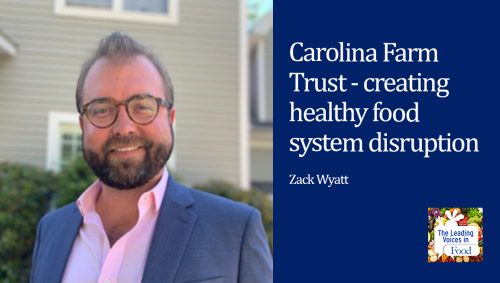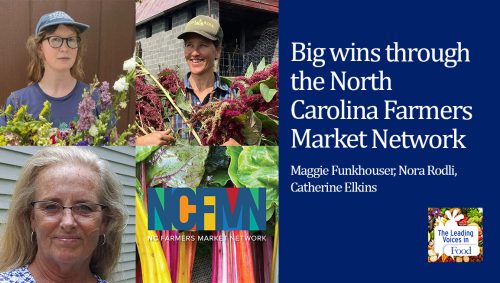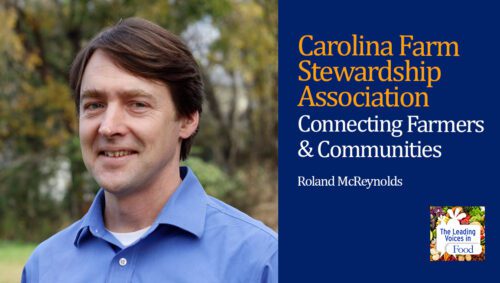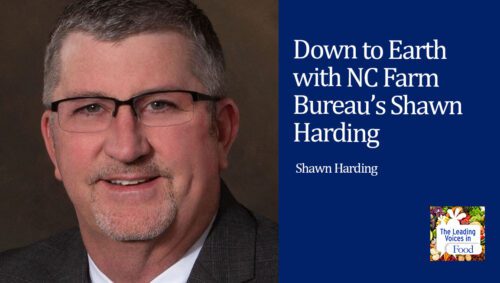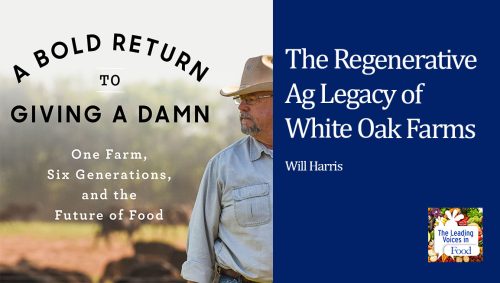The Leading Voices in Food
E49: Pitt Family Farm Story
More than 90% of farms in the US are small or family owned and operated businesses. These farms play a vital role in our economy and help to maintain rural populations. But small farms face many challenges, including encroaching urban development, dramatically changing weather patterns, young people moving to urban areas for work, low commodities pricing, and farm financing. What’s more, our farming core is aging. The average age of farmers in the US today is 58. Today we share the story of Bert and Gwen Pitt, seventh generation farmers in Edgecombe County, North Carolina.
Subscribe: Apple Podcasts | TuneIN | Google Podcasts | SoundCloud | PocketCasts | Radio Public
Tags: Agriculture & Tech | North Carolina | Voice of Farming |

Bert and Gwen Pitt of Edgecombe County, North Carolina, are seventh generation farmers. The Pitt Family Farm encompasses 1,100 hundred acres, with125 acres in sweet potatoes and about 800 acres of cotton.
More than 90% of farms in the U.S. are small or family owned and operated businesses. These farms play a vital role in our economy and help to maintain rural populations. But small farms face many challenges, including encroaching urban development, dramatically changing weather patterns, young people moving to urban areas for work, low commodities pricing, and farm financing. What’s more, our farming core is aging. The average age of farmers in the U.S. today is 58. Today we share the story of Bert and Gwen Pitt, seventh generation farmers in Edgecombe County, North Carolina.
BERT: Well, I’m basically the sixth generation on the farm. My ancestors started in 1825 here. The home that we still live in was built about 1830 or finished about 1830.
All right, well we’re about 1,000–1,100 hundred acre farm. We raise main crops are 125 acres of sweet potatoes and about 800 acres of cotton.
I have had the privilege of working with my grandfather and my dad and now my son-in-law. I’ve seen several generations together on the farm and one of my full beliefs is that that’s what it takes to make it successful. You got the older people, which I am now, that’s got the understanding and stability, maybe is the word. And the younger generation has got the gung ho and ready to do new ideas, and you need to keep an open mind. Not just me, but younger generation needs to keep an open mind, and I might know what I’m talking about too. But it’s the blend of the new and the old, I think, helps make a family farm successful in today’s world.
As a kid growing up after I got of age, I was expected to work on the farm like everybody else, maybe not as rough a job, but I worked. And now they put me on a tractor went I was about seven, eight years old called trucking tobacco, where I would actually drive the tractor down the truck rows, and I was too little to even mash the clutch in, so my dad had kind of rigged up a little device to where the hydraulics of the tractor would pull the clutch in and out, so I just could move it up and down those sled roads, is what they were called. So the workers on each side could put the tobacco in the trailers, and then at the other end somebody else would actually turn it around. So my first job was driving a tractor at eight or nine years old, and then gradually started doing a little bit more labor intensive jobs.
And I never remember a day that I didn’t think I was going to be a farmer. You know, just from day one. I enjoyed hanging around the farm, the work that was going on. There was always something they might, the older ones, might have always called it something that I could get into. But to me it was something I could kind of play and do things. There was always something to do.
At that time you were around all different kinds of animals. We had all the hogs, cows, always dogs around, loved dogs. So, you know, growing up you had mules and all that stuff, so there was plenty to do, and never a dull minute. Pond to fish in.
Growing up I was like all the other farm boys, I wanted to hunt. So, you know, just it’s a lifestyle that has changed some. But I can look at my grandkids in 2019 and see that they’re basically doing the same thing I did 55 years ago. So it hadn’t changed. I think there’s just more stuff that they can get into, using the same words now.
You do have to be careful, and I respect the safety issue of what they do. And I’m sure that other generations did the same thing for me too. But that’s just part of being a parent and a grandparent.
Well they’re some of the fond memories I have, you know, and going to the market. When we would see the fruits of their labor for the whole year that my parents, grandparents did. Selling tobacco, I used to love going to the warehouse to sell tobacco with the chant of the auctioneer, and people almost dressed up to sell tobacco. It was like a, I don’t know, a holiday or something.
Especially the first day of the year of selling, everybody was in coat and ties and free Pepsi Colas, free nabs. It was just a big event to do. Even just like selling corn out of the field, soybeans, wheat, all that stuff. Enjoyed carrying that too, to market, to mills. And it was just a fun day. And for the farmers they were selling it. It was a fun day for them. They’d worked all year and finally got a little return for it.
So I enjoyed all parts of farming, and I’ll say one of the pleasures over the years, still this way, is the people, and I’ll give you credit for this too. You know, seemed like everybody that’s touching the farm, even the salesman, you glad to see people come up, they’re good people. You enjoy talking to them, get a different perspective. You learn just as much from talking to other farmers as you do, say from experts.
And we’re still, especially where I live, we’re not competing against each other by any means. We want to see our neighbors succeed. If I succeed and my neighbors succeed, I feel like I do if they do. We got the exact same problems. So we still can get together, a lot of people ask me because I’m one of the older ones in the neighborhood now, even at 68 years old.
But you know, we get together and get ideas from each other that things that work for my neighbors, I incorporate it into my farming operation, and vice versa. And I always make a joke about it. Last year we had a great cotton crop, and especially young guys, they’ll come to me wanting to know, well, Mr. Bert, what are you doing? I say nothing different than you are, and they get ready to walk off and I will say, “Oh yeah, there is one thing that I do probably different than what you do.”
And I get their attention and they’ll turn around and I’ll tell them, “I talk to my crops.” I said, “I actually go out there in the field and talk to them and tell them what it needs to do at the end of the year, how much it needs to bring in, you know? If I need a new truck or whatever.” And so then they bust out laughing. But that’s the only difference I do that they don’t do.
But we do learn a lot from each other and the pleasure of the people, like I said, is one of one of the profits in the farming. Meeting good people from all across the state and nation. Everybody seems that they are very friendly, knowledgeable people that you enjoy talking to.
GWEN: Well, my name is Gwen Pitt. I was actually raised in Virginia, moved here to North Carolina, met Bert and we got married and I have been married to him 40 years. So I married into the farm life and helped out where I could in the beginning, but seemed to be adding on more responsibilities as we’ve gotten older in the operation.
But Bert is a sixth generation farmer here in Edgecombe County, in the St. Louis community. And it was in his blood, from what I’ve been told. And he knew when he left college, he wanted to farm. He actually did not want to go to college, but his parents says you’re going to college. So he went into business management, which has actually helped him the whole way through his farming career, and a good manager, good management. I never wanted to take on his books because he already had his system ready to go.
So I have enjoyed farming. It’s a good lifestyle. It’s a hard lifestyle, but it’s good, and it has its challenges but we learned to overcome them by discussing them out and talking about it. So I think that we make a good team right now. Sure do.
Right now what we grow is cotton, soybeans and wheat, and sweet potatoes. We used to be a big tobacco farmer. This farm, I mean, it grew. It started with tobacco. I mean it grew and tobacco is what, you know, has kept the generations going. But it came to the time that, you know, we decided it was time to move on and find something else to grow.
Tobacco was… and at the age, as you get older and you’re out there in the 95 and 100 degree weather, harvesting tobacco, and you’re getting on up into 60 years old and 65, most people are trying to retire and we’re sitting there like, how many more years can I do this? Your health, you got to start looking at. But we just decided that it was time for us to change and move on, especially too, we were out there working hard all summer long and not making anything, just barely making… paying for the labor because the labor costs go up.
You know, and everybody’s like, well we need more money. Well the farmers need more money too, but we can’t pay you if the crop doesn’t bring in a certain amount. So it’s been five years since we had tobacco and we switched to the sweet potatoes. Now it’s got issues, but it’s not as labor intensive as far as us. But it does allow me, you know, while he’s setting sweet potatoes and everything, I can be working on the cotton or checking the cotton.
So it kind of keeps… We’ve all got our jobs. We have one full-time worker and my son-in-law is a Raleigh fireman, and so he does a 24 hour shift and then he comes home and that day he’s here he works on the farm. So he’s more or less a part-time farmer for us. And then there’s me and Bert.
So we handle things until it’s time to harvest the sweet potatoes and then we hire. When it’s time to set out the sweet potatoes, we hire a group of people. But then for the cotton, all we need is one or two more people when we start picking the cotton. So we’ve kind of got it down to what we enjoy to manage so that we can have time on the weekends to do what we like.
And what we do like to do is go to the beach, so we carry the grandsons down to the beach. Family means a lot. Bert’s mother still lives right here on the farm, right across the field. Like I say, my daughter and her husband and the boys are across the road, but we’re all still here. His brother is right down at the end of the path. He’s an attorney in Pine Tops.
So he feels like that this farm is what holds the whole family together. And he has cousins because over the years, of course, the ancestors have left to this… Everybody had to have a piece of it. But the cousins that own some of the property around us are most likely looking to us to, if their families don’t want to continue it, for us to purchase it. So we have purchased some land through the family and gotten it back to keep it here with the core of the land.
BERT: And this was sort of the vacation spot back then. We didn’t have the luxury of doing things that we can do now for vacations or whatever. And Christmas and Thanksgiving especially, you know, the whole family gathered there with the kids. And I remember a lot of desserts that my grandmamma made and every time, I lived about a quarter of a mile down the path from my grandmamma’s house that I live in now, and granddad’s. And just going up there any time of the year, anytime of the day, you know, she was always ready. It was just almost like Aunt Bea, you know, she was ready to feed and make sure everybody left full and all such as that.
But the memories of the fun gatherings in the home was one of the basics of farm life, and I could tell now looking back again, I’ll say as a kid you don’t think about it then, but now looking back, I could tell that all the visitors that came back, the family members that lived away, they really enjoyed coming back. It was their coming home experience, and I can tell all the grandkids like coming up there now, even though they live right here on the farm like I did.
According to the 2017 USDA National Agricultural Statistics Service Report, North Carolina has lost nearly 4,000 farms from the 46,000 farms recorded in 2012. This is a big concern to farmers like Bert and Gwen.
BERT: There’s not enough of us out there to make our lifestyle and what we’re doing known to people. And there’s a lot, of course it’s probably this way with everything, but there’s a lot of misinformation out there about what’s going on the farm. I really want to believe that most of the people in the United States still respect the family farm.
The family farm has changed. I grew up on a farm of probably 300 acres. Now I’m 1,000. I give up 500 acres, used to 1,500. And so the family farm has changed. The family farm might have 16 chicken houses on it. The family farm might have four or five hog houses on it. So we’re feeding the United States the best that we know how. And we do the same thing with the crops that I grow in the field. We’re not going to go out there and put something down, extra fertilizer, extra, anything.
GWEN: Over the 40 years of marriage and farming, we have come to make a good team, and I hope, that’s what I say, I’m hoping that we’ll follow along and pass on to the next generation that’ll be here.

